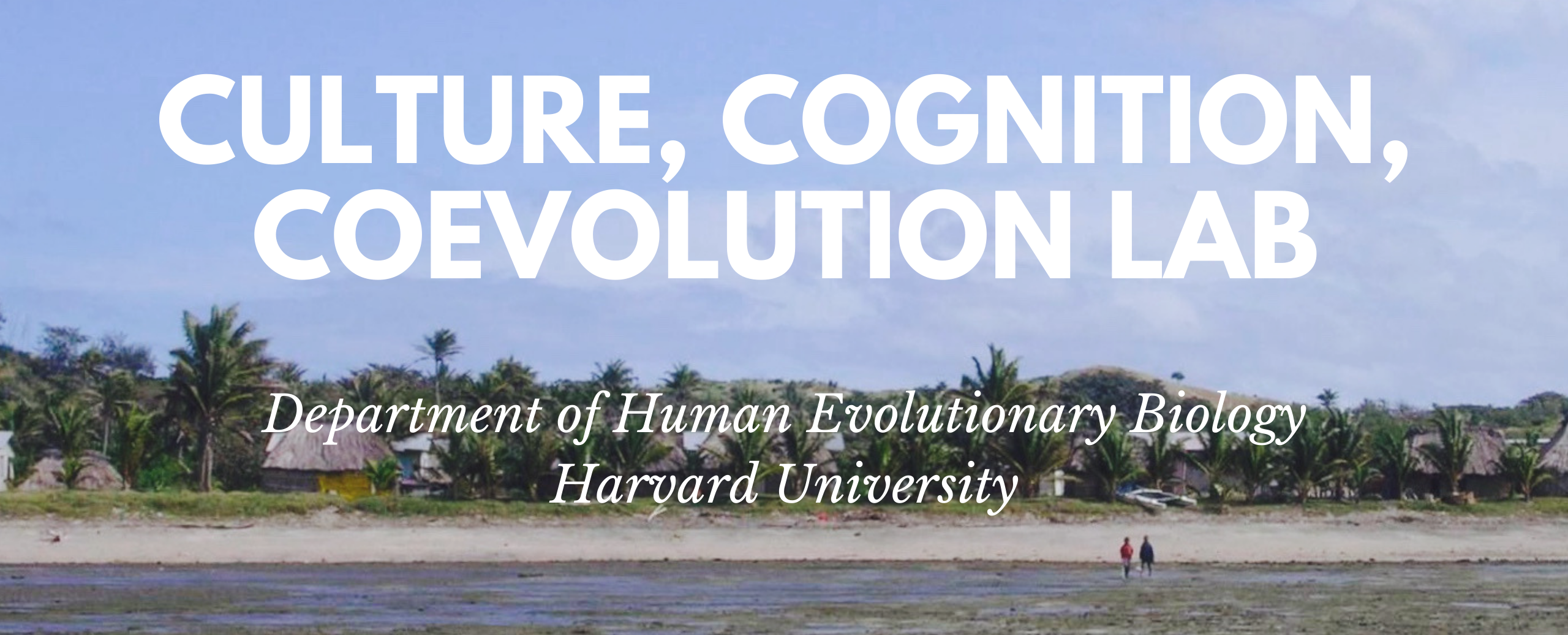 Database of Global Cultural Evolution
Database of Global Cultural Evolution
The Database of Global Cultural Evolution links historical data on cultural practices to contemporary populations around the world.
The historical data come from the Ethnographic Atlas (EA), a database containing ethnographic information on 1,291 pre-industrial societies around the world. The Ethnographic Atlas contains coded variables on subsistence economy, social and political organization, marriage and kinship patterns, inheritance, etc. Contemporary populations in our database are defined based on living languages of the world.
 Cultural Distance Scale
Cultural Distance Scale
The Cultural Distance Scale is a tool and a method for measuring the psychological and cultural distance between societies and creating a distance scale with any population as the point of comparison. This tool was developed in the Culture, Cognition and Coevolution Lab and was published here. We applied the fixation index (FST), a meaningful statistic in evolutionary theory, to the World Values Survey of cultural beliefs and behaviors. As the extreme WEIRDness of the literature begins to dissolve, our tool will become more useful for designing, planning, and justifying a wide range of comparative psychological projects. Our code and accompanying online application allow for comparisons between any two countries.
 IPUMS: Integrated Public Use Microdata Series
IPUMS: Integrated Public Use Microdata Series
IPUMS is the world's largest individual-level population database. It provides census and survey data from around the world integrated across time and space. IPUMS integration and documentation makes it easy to study change, conduct comparative research, merge information across data types, and analyze individuals within family and community context. Data and services available free of charge.
 CLICS: Database of Cross-Linguistic Colexifications
CLICS: Database of Cross-Linguistic Colexifications
 D-PLACE: The Database of Places, Languages, Cultures, & Environment
D-PLACE: The Database of Places, Languages, Cultures, & Environment
A database of over 1400 societies, D-PLACE synthesizes cultural data with geographic and environmental information. The cultural data is based on the work of anthropologists George Murdock and Lewis Binford, representing pre-1950 ethnographic data. The database can be searched by location, language group, cultural trait, & environental variables, and results can be visualized as a table, map, or linguistic tree.
 The Database of Religious History
The Database of Religious History
The Database of Religious History "aims to be the world's first comprehensive, online quantitative and qualitative encyclopedia of religious and social history. Open source, free and shaped in content and function by its users, it will function as a massive, standardized, searchable encyclopedia of the current best scholarly opinion on historical religious traditions and the historical record more generally, allowing users to instantly gain an overview of the state of scholarly opinion and access powerful, built-in analytic and data visualization tools."
 Atlas of Economic Complexity
Atlas of Economic Complexity
Developed by Harvard's Center for International Development, the Atlas of Economic Complexity is a "powerful interactive tool that enables users to visualize a country’s total trade, track how these dynamics change over time and explore growth opportunities for more than a hundred countries worldwide."
 GDELT Project
GDELT Project
The GDELT Project is a large, global database of human societies "that monitors the world's news media from nearly every corner of every country in print, broadcast, and web formats, in over 100 languages, every moment of every day and that stretches back to January 1, 1979 through present day."
 Glottobank
Glottobank
Glottobank is "an international research consortium established to document and understand the world’s linguistic diversity. Glottobank team members are pursuing this goal on two fronts. First, we have established four global databases documenting variation in language structure (Grambank), lexicon (Lexibank), paradigm systems (Parabank) and phonetic changes (Phonobank)."
 Global Terrorism Database
Global Terrorism Database
The Global Terrorism Database (GTD) is an "open-source database including information on terrorist events around the world from 1970 through 2015 (with annual updates planned for the future). Unlike many other event databases, the GTD includes systematic data on domestic as well as international terrorist incidents that have occurred during this time period and now includes more than 150,000 cases."
 Database of Political Institutions
Database of Political Institutions
The Database of Political Institutions "presents institutional and electoral results data such as measures of checks and balances, tenure and stability of the government, identification of party affiliation and ideology, and fragmentation of opposition and government parties in the legislature, among others. The current version of the database, which is now hosted at the Inter-American Development Bank, expands its coverage to about 180 countries for 40 years, 1975-2015."
 Global Price and Income History Group
Global Price and Income History Group
The Global Price and Income History Group (GPIH) hosts a collection of data sets on historical income, prices, GDP, and government budget from around the world.
 AnthroTools
AnthroTools
A package for R, AnthroTools contains tools for analysing ethnographic data. Specifically, it contains functions for multi-factor free-list analysis and cultural consensus analysis.
 Diverse
Diverse
Diverse is an R package that utilizes interdisciplinary concepts of diversty to create a tool for calculating and visualizing different aspects of diversity in complex systems. Read more about the package here.
